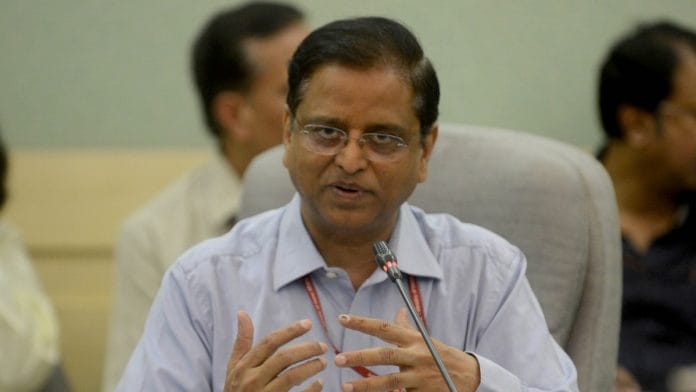New Delhi: Senior bureaucrat Subhash Chandra Garg’s offer to resign from the finance ministry — a day after he was abruptly shifted to the relatively less prestigious power portfolio — has raised several eyebrows in the administrative circles, with many even arguing that this may be the first high-profile resignation of a key civil servant in over three decades.
In a major bureaucratic rejig Wednesday, the Narendra Modi government transferred Garg, a vocal 1983-batch IAS official who took over as the secretary, Department of Economic Affairs, in June 2017. He was appointed as the finance secretary only in March 2019.
Garg, who has sought retirement under the Voluntary Retirement Scheme (VRS), was supposed to be in service till October, 2020.
“This is obviously a protest resignation,” said a senior IAS officer, on condition of anonymity.
“Garg wants to sent out the message that he would rather resign from service than work in a ministry of lower profile. He was the senior-most official in the finance ministry and has been shunted out unceremoniously,” the official said.
Also read: Modi govt reshuffles top secretaries, Ajay Kumar Bhalla to be next home secy
First senior IAS resignation under Modi government
While bureaucrats seeking voluntary retirement is hardly an aberration, this may be the first high-profile resignation after former foreign secretary A.P. Venkateswaran resigned from the Rajiv Gandhi government in 1986.
“While addressing the media in 1986, Rajiv Gandhi was asked a question about the foreign secretary and he told reporters that they will soon be talking to a new foreign secretary,” a retired IAS official said. “Venkateswaran gave his resignation an hour later. That was the last resignation at this level.”
“Of course there have been other ways of protesting. Officials go on central deputation or return to their states if they are unhappy. But voluntary retirements at such a senior level has not happened before,” he added.
While governments under Modi have seen resignations of RBI governors Raghuram Rajan, Urjit Patel and Viral Acharya, chief economic advisor Arvind Subramaniyan and NITI Aayog vice-chairperson Arvind Panagariya, if accepted, this would the first senior IAS resignation in the government.
Arvind Mayaram’s case
Garg’s case is very similar to former finance secretary Arvind Mayaram — who was transferred to the less-prestigious minority affairs ministry only six months after his inclusion in the finance ministry, said the IAS officer quoted above.
“Mayaram was also shunted out from finance to minority affairs ministry rather arbitrarily,” the officer said. “But he did not resign. Garg probably felt too belittled to continue to serve in the government.”
Even though a bureaucrat cannot question her or his place of posting or removal from office, there is an informal hierarchy that is generally respected, he added.
“Like the person who is now slated to be home secretary (Ajay Kumar Bhalla) is a 1984-batch official — a year junior to Garg. Now, he is being sent to the high-profile home ministry while Garg would be replacing him in power ministry.”
IAS officer Bhalla is set to be the new home secretary when incumbent Rajiv Gauba retires at the end of August.
Even in the last term of the Modi government, abrupt, quick and unexplained transfers of senior IAS officers at secretary-level positions were rampant — much to the dismay of the fraternity.
“Senior officers obviously feel belittled when they are asked to pack their bags and go elsewhere without any conspicuous reason,” said an IAS officer on central deputation. “But Garg is probably the first one to react publicly in this way.”
Also read: New anxiety among IAS officers in Delhi as Modi govt picks only 7 for 33 top posts







Raghuram Rajan completed his term, he didn’t resign. Viral Acharya was the deputy governor and not the governor.
Vrs has its own benefits apart from drudgery of work and freedom though perks which are main attraction in civil service
I think prestige (ego) is common to both Bureaucracy and Politicians too. May I ask was it first time such thing happened in Bureaucracy? What was happening during Nehru, Indira Gandhi or even Rajiv Gandhi periods? Did such thing take place in Bureaucracy, Judiciary and even in Armed forces too. Most dogmatic and dictatorial was Indira Gandhi. Did any senior Journalist ever dare to condemn this kind of political decision in Public domain at all?
Dr. Ambekar
Reuters reports that the proposal to issue sovereign bonds in foreign currency has been put on hold. Some are saying the proposal is now dead in the water. Remarkable how a decision of such magnitude could be the handiwork of a single mandarin. Issues a tiny fraction of this qualify to be decided by the Cabinet. The transaction of business Rules in government have evolved and been refined over generations. Unclear if the new pathways are leading to a better destination.